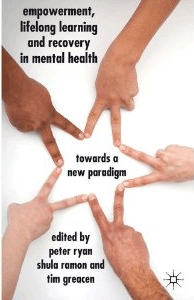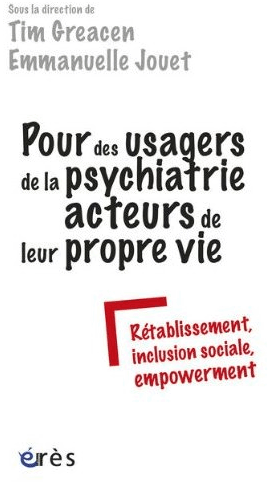EMILIA Project
The EMILIA Training has the overall aim of improving the social inclusion of disadvantage groups such as mental health service users. Through lifelong learning, the training aims to help service users experience greater participation and inclusion either in the delivery of services or in education and training delivery in meaningful ways, including greater social inclusion and paid employment.
The EMILIA Training offers 10 individual programs which, each in their own way, aim to increase social inclusion and empowerment. In addition, we have also developed a complete package, "EMILIA Education", where students can access both life and work skills.
Visit the EMILIA Training web site where, after registering, you can gain free access to all the available training material.
More Information
EMILIA Publications
Anczewska M., Roszczyńska-Michta J., Chrostek A., Waszkiewicz J., Czabała C., Świtaj P., Personal Recovery Plan as educational and empowering tool for mental health services in: Comparative Education, Teacher Training, Education Policy, Social Inclusion and Child Psychology ed. Nikolay Popov, Charl Wolhuter, Bruno Leutwyler, Marinela Mihova, James Ogunleye, Zafer Bekiroğulları, Bureau for Educational Services, Sofia, Bulgaria, 2009, 293-299, ISBN 978-954-9842-14-2
Anczewska M. & Ryan P. Lifelong learning and recovery: an account from the perspective of the EMILIA project. Occasional Papers in Education & Lifelong Learning an international journal, Middlesex University, 2009, 3, 59-68
Dermentzi. M, (2008) The EMILIA Mental Health Services Users and Professionals Meeting: Bridging the “Us and Them” Gap: Fighting for Our Autonomy Tetradia Psichiatrikis 102: 50-52
Flores, P., Palomer, E., Domínguez, T., Rosado, S., Izquierdo, R., Ní Laocha y, E., Masferrer, C. (2007) The EMILIA project, an introduction COPC Catalan Psychologists Magazine
Flores, P., Palomer, E., Domínguez, T., Rosado, S., Izquierdo, R., Ní Laocha y, E., Masferrer, C. (2010) Training of mental health service users, the EMILIA project. Spanish Associtation of Neuropsychiatry AEN.
Greacen, T., Jouet, E. (2009) Psychologie communautaire et recherche : l’exemple du projet EMILIA [Community psychology and research: The example of the EMILIA project] Pratiques psychologiques Vol. 15, numéro 1pages 77-88
Greacen, T., Jouet, E. (2008) The Emilia project: accessing lifelong learning and reducing social exclusion L’information psychiatrique Vol. 84, Number 10
Griffiths, C. (2006) The theories, mechanisms, benefits, and practical delivery of psychosocial educational interventions for people with mental health disorders. International Journal of Psychosocial Rehabilitation Vol. 11 (1), 21-28
Griffiths, C. (2009) The EMILIA project: The impact of a lifelong learning intervention on the sense of coherence of mental health service users. The International Journal of Psychosocial Rehabilitation Vol. 14 (1) 35-49
Griffiths, C., Ryan, P. (2008) Recovery and Lifelong Learning: Interrelated Processes. International Journal of Psychosocial Rehabilitation Vol 13(1). 51-56 31.12.2010
Kvaternik, J., Grebenc, V. Vrzeli med medicino in socialnim delom : primer "dvojnih diagnoz" (English title: Gaps between medicine and social work: dual diagnosis) Teorija in praksa jan.-apr. 2008, 45, 1/2, pp. 129-143.
Lambaki, C., Chondros, P., Stylianidis, S. (2008) Implementing lifelong learning for the social inclusion of people with mental health problems: the EMILIA project Tetradia Psichiatrikis 102: 45-49
Oguneye, J., and Kaunonen, M. (2010) Lifelong Learning and Mental Health LLinE 2010, 2
Ogunleye, J., Griffiths, C., and Stenfors-Hayes, T. (2007) Using lifelong learning as a tool for achieving the social inclusion of mental health service users and other disadvantaged groups: findings from a review of lifelong learning policies in Europe, WCCES Conference. Proceedings, The XIII World Congress of Comparative Education Societies, Sarajevo, 3-7 Sept 2007.
Ramon, S., Griffiths, C., Nieminen, I., Pedersen, M.-L., Dawson, I. Towards social inclusion through lifelong learning in mental health: analysis of change in the lives of the EMILIA project service users International Journal of Social Psychiatry Jan 2010; vol.
Ramon, S., Ryan, P., Urek, M. (2010) Attempting to mainstream ethnicity in a multi country EU mental health and social inclusion project: lessons for social work European Journal of Social Work (Special Issue: ‘Race’/Ethnic relations and social work) 2010 in print.
Roszczyńska-Michta J. Anczewska M., Waszkiewicz J. Zdrowienie – budowanie własnej narracji, Instytut Psychiatrii i Neurologii, Warszawa, 2009, ISBN 978-8361705-01-7
Stenfors-Hayes, T., Griffiths, C., Ogunleye, J. (2008) Lifelong learning for all? Policies, barriers and practical reality for a socially excluded group Journal of Lifelong Education 27(6)
Stylianidis, S., Chondros, P., Lambaki, C., (2008) The mental health services users’ movement in relation with professionals: Constructing a common meaning Tetradia Psichiatrikis 102: 37-44
Stylianidis, S., Ryan, P. (2007) Achieving Social Inclusion for mental health service users through Life Long Learning: the EMILIA Project WAPR bulletin http://www.wapr.info/Bulletins/WAPRBullDecember2007v2.pdf
Urek, M., Ramon, S. (2008) Uveljavljanje nacela enakopravnosti glede etnicnosti in spola v dusevnem zdravju (Title of article in English: Mainstreaming Ethnicity and Gender in mental health) Soc. Delo 2008, let. 47, st. 3/6, str. 177-186





